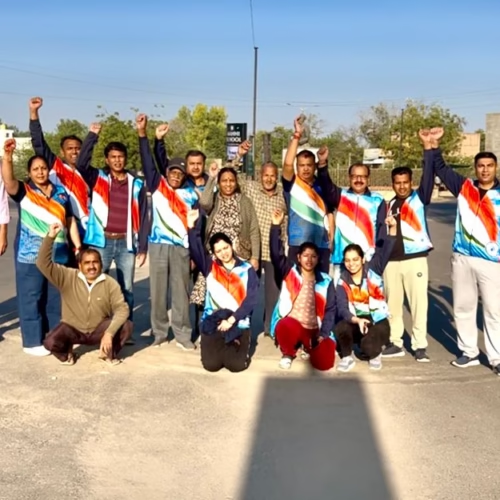BY DEFENCE JOURNALIST SAHIL | T.I.N. NETWORK
China’s Genetic Warfare Gambit: Inside the Alarming Push for Genetically Enhanced ‘Super Soldiers’
A Bold New Frontier in Warfare or A Dangerous Leap?
China’s People’s Liberation Army (PLA) is reportedly advancing into a controversial and dystopian frontier of modern warfare—the creation of genetically enhanced super soldiers. The revelation, brought to light by Nicholas Eftimiades, a respected former U.S. intelligence officer and expert on Chinese espionage, has once again raised global alarm over China’s opaque military experiments.
In an exclusive report published by The Hill, Eftimiades claims that the Chinese military is “actively working to genetically modify human beings to enhance physical and cognitive capabilities in combat”. This marks a dangerous escalation in the domain of hybrid warfare, potentially breaching the boundaries of international law, ethics, and science.
Genetic Engineering and Militarization: A Brewing Storm
The idea of creating “super soldiers”—once limited to science fiction and comic books—may now be approaching reality through the use of CRISPR gene-editing technologies, bio-enhancement protocols, and deep research into human genome manipulation. If true, this could give the PLA an edge in terms of soldier resilience, reaction time, battlefield decision-making, and physical endurance.
Eftimiades warns that China’s advances are part of a long-term military strategy that fuses biotechnology, artificial intelligence, robotics, and cognitive sciences—a concept known as “Military-Civil Fusion” (MCF). This strategy aims to blur the line between civilian scientific research and military application, accelerating the transition from labs to the battlefield.
Past Signals: Echoes from U.S. Intelligence
Concerns regarding Chinese experimentation in this domain aren’t entirely new. In 2020, John Ratcliffe, then U.S. Director of National Intelligence, wrote in The Wall Street Journal that China “conducted human testing on members of the PLA in hope of developing soldiers with biologically enhanced capabilities.” The Pentagon’s reports have also acknowledged that China is seeking biotechnological superiority as part of its long-term military modernization goals.
Experts fear this push could result in highly trained, biologically modified soldiers capable of operating under extreme conditions, recovering quickly from injuries, or even showing decreased emotional response to violence—a deeply concerning development for global norms of warfare.
Legal and Ethical Dilemmas: A Global Time Bomb
The use of gene-editing technology for military purposes raises urgent bioethical concerns. There are no international treaties or UN frameworks that explicitly govern the militarization of biotechnology. This gap allows authoritarian regimes like China to operate in legal grey zones, without oversight or accountability.
Dr. Edwin Black, a global expert on bioethics, warns: “You’re looking at the militarization of the human genome. This is not just about creating a better soldier—it’s about crossing a moral Rubicon. Once crossed, there may be no going back.”
Moreover, such programs could pressure other nations, including democracies like the United States, India, and European powers, to launch similar enhancement projects to avoid battlefield disadvantages, thereby triggering a biotechnological arms race.
From Genomes to Geopolitics: India and the World Must Prepare
India’s defence planners and intelligence agencies are now closely monitoring China’s biotech advances, especially in regions such as Tibet, Xinjiang, and border areas where human endurance and combat stamina are critical. Sources within India’s DRDO and NTRO are reportedly collaborating with top bio-research institutions to evaluate countermeasures and bio-defence strategies.
Experts also emphasize the need for a global biosecurity treaty to prevent the military misuse of biotechnology. With the Indo-Pacific becoming the new theatre of strategic competition, India’s preparedness will depend not only on missiles and drones, but also on genetic intelligence and biological containment frameworks.
Science or Sinister Warfare?
While China justifies such research under the guise of “scientific advancement”, the militarization of genetic technologies poses one of the greatest moral and existential risks to humanity. The idea of soldiers engineered in labs, programmed for war, immune to pain or fatigue, and stripped of human empathy, is no longer theoretical.
The question now is not if such super soldiers will exist—but how soon and how far the world is willing to go to stop them.
चीन की नई युद्ध नीति: अब जेनेटिक तकनीक से तैयार होंगे ‘सुपर सोल्जर्स’?
बीजिंग की पीपुल्स लिबरेशन आर्मी (PLA) अब युद्ध के मैदान को विज्ञान की प्रयोगशाला में बदलने की दिशा में बढ़ रही है। अमेरिका की खुफिया एजेंसी के पूर्व अधिकारी निकोलस एफ्टीमियाडेस ने दावा किया है कि चीन की सेना मानव डीएनए में बदलाव करके ऐसे ‘सुपर सोल्जर्स’ तैयार कर रही है, जो सामान्य सैनिकों से कहीं अधिक ताकतवर, तेज सोच वाले और कठिन परिस्थितियों में जूझने में सक्षम होंगे।
यह रिपोर्ट अमेरिकी अखबार द हिल में प्रकाशित हुई है, जिसमें दावा किया गया है कि चीन के सैन्य अनुसंधान संस्थान सक्रिय रूप से जैविक अनुवांशिक संशोधन (Genetic Engineering) में लगे हुए हैं, और इसका लक्ष्य सैनिकों की मानसिक और शारीरिक क्षमताओं को ‘सुपर ह्यूमन’ स्तर तक बढ़ाना है।
विज्ञान और युद्ध का संगम: नई चुनौती
आज जिस तकनीक को हम ‘साइंस फिक्शन’ फिल्मों में देखते थे, वह हकीकत बनती जा रही है। चीन, CRISPR जैसी अत्याधुनिक जीन-एडिटिंग तकनीक का प्रयोग करके ऐसे सैनिक बना सकता है जिनकी सहनशक्ति, निर्णय लेने की गति, चोट से उबरने की क्षमता और भावनात्मक निर्भरता बेहद कम हो।
चीन की यह नीति उसकी ‘मिलिट्री-सिविल फ्यूज़न’ रणनीति का हिस्सा है, जिसमें वैज्ञानिक प्रयोगों को सीधे सेना में लागू करने की प्रक्रिया को तेज़ किया गया है। इससे PLA को भविष्य के युद्धों में जैविक और मानसिक स्तर पर एक असाधारण बढ़त मिल सकती है।
पुरानी चेतावनियाँ, नई पुष्टि
यह कोई पहली बार नहीं है जब चीन के इस तरह के प्रयोगों की बात सामने आई हो। 2020 में अमेरिका के तत्कालीन खुफिया प्रमुख जॉन रैटक्लिफ ने भी कहा था कि चीन PLA सैनिकों पर जैविक परीक्षण कर रहा है, जिससे उनकी युद्धक्षमता को बढ़ाया जा सके।
अब एफ्टीमियाडेस का बयान उस खतरे की पुष्टि करता है, जिसका अंदेशा अंतरराष्ट्रीय समुदाय को वर्षों से था। यदि PLA इस दिशा में सफल होता है, तो यह युद्ध के मानव मूल्यों और अंतरराष्ट्रीय सैन्य नैतिकता पर सीधा हमला होगा।
कानूनी और नैतिक संकट
मानव जीन में छेड़छाड़ कर सेना के लिए ‘सुपर ह्यूमन’ बनाना अंतरराष्ट्रीय मानवाधिकार और जैव नैतिकता (Bioethics) के गंभीर उल्लंघन के दायरे में आता है। इस विषय पर कोई स्पष्ट अंतरराष्ट्रीय कानून या संधि नहीं है, जिससे चीन जैसी सत्तावादी ताकतों को खुली छूट मिल जाती है।
जैविक युद्ध विशेषज्ञों का मानना है कि यह 21वीं सदी के लिए एक नया परमाणु संकट बन सकता है। यदि एक देश ऐसा करता है, तो अन्य देश भी जैविक हथियारों और सैनिकों के अनुवांशिक संशोधन की होड़ में कूद सकते हैं।
भारत की तैयारी और चेतावनी
भारत की खुफिया एजेंसियाँ और DRDO अब चीन की इन गतिविधियों पर बारीकी से नजर रख रही हैं, खासकर उन इलाकों में जहां अत्यधिक भौगोलिक चुनौतियाँ हैं जैसे तिब्बत और पूर्वी लद्दाख। भारत को जैविक सुरक्षा (Bio-security) और रक्षा के क्षेत्र में एक नया रोडमैप तैयार करना होगा, जिससे ऐसी रणनीति का मुकाबला किया जा सके।
इसके साथ ही, भारत को संयुक्त राष्ट्र और QUAD जैसे मंचों पर इस विषय को प्रमुखता से उठाना चाहिए, ताकि जैविक युद्ध और जीन-एडिटिंग पर एक अंतरराष्ट्रीय नियंत्रण स्थापित किया जा सके।
विज्ञान या संहार की राह?
चीन का यह कदम भविष्य के युद्ध की एक नई, और शायद सबसे खतरनाक परिभाषा गढ़ रहा है। जहां सैनिक अब मशीन नहीं, बल्कि विज्ञान द्वारा रूपांतरित जैविक अस्त्र बनते जा रहे हैं।
प्रश्न यह नहीं है कि यह होगा या नहीं। प्रश्न यह है कि यह कितनी जल्दी होगा, और दुनिया इसे रोकने के लिए क्या करेगी।












Add Comment